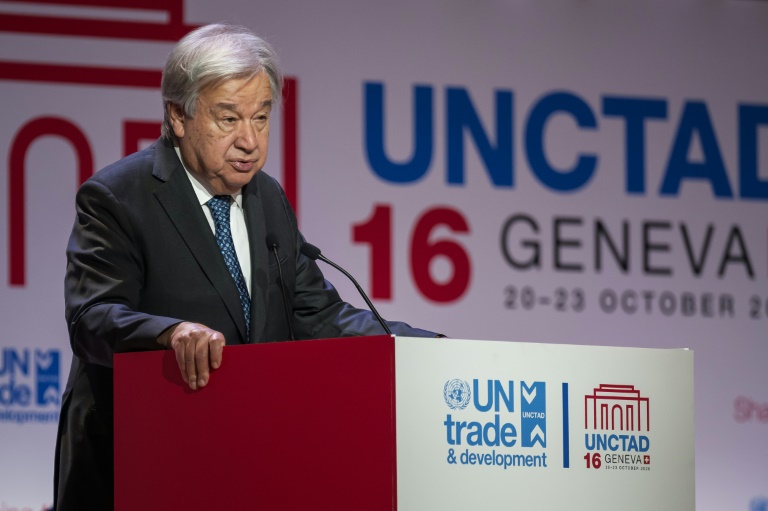
UPDATE: UN Secretary-General Antonio Guterres issued a stark warning today, stating that the global debt crisis poses an imminent threat to the international trade system. Speaking at the 16th UN Conference on Trade and Development in Geneva, Guterres highlighted how escalating debt levels are forcing countries to prioritize creditor payments over crucial investments in health and education.
The situation is dire: Global public debt has skyrocketed to $102 trillion, with developing nations alone accounting for $31 trillion of that total. These countries are now paying a staggering $921 billion in interest, exacerbating poverty and hunger across the globe. “Trade barriers are rising, with some least-developed countries facing extortionate tariffs of 40 percent, despite representing barely one percent of global trade flows,” Guterres warned.
As the world grapples with a “whirlwind of change,” Guterres emphasized that 75 percent of global growth is now driven by developing nations. However, geopolitical tensions and climate crises are stifling progress. “We see a rising risk of trade wars for goods,” he stated, underscoring the urgent need for a coordinated international response.
To address the escalating crisis, Guterres announced the formation of the Sevilla Forum on Debt, aimed at unlocking financing for developing countries and alleviating their debt burdens. This initiative seeks to improve access to lower borrowing costs and expedite support for nations in distress. The first meeting of the Sevilla Forum is set to take place next year.
UNCTAD revealed that 3.4 billion people live in countries where debt servicing trumps spending on health or education. “It’s a slow erosion of development, one budget cut at a time,” said UNCTAD’s chief, Rebeca Grynspan. She added, “True stability means countries can plan beyond the next payment.”
Guterres reiterated the need for a “fair global trade and investment system” and emphasized the necessity of aligning trade policies with climate objectives. He acknowledged that, while protectionism might sometimes be seen as necessary, it must be approached rationally.
As the world faces mounting uncertainty, Guterres’s appeal for urgent action resonates louder than ever. The implications of the debt crisis extend beyond economics; they threaten the very fabric of global stability and development.
Stay tuned for more updates as this developing story unfolds. The international community must act swiftly to avert a deeper crisis that could impact millions worldwide.







